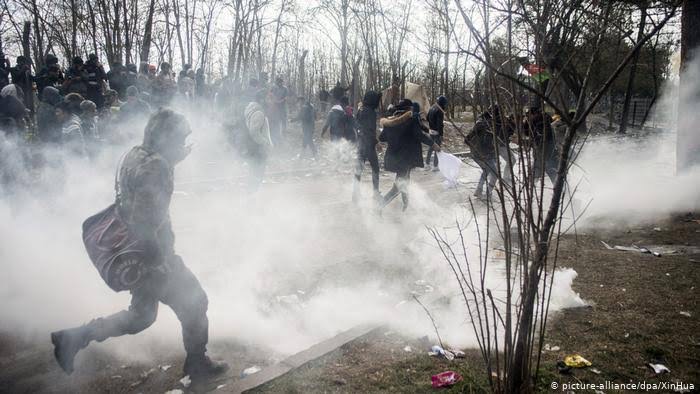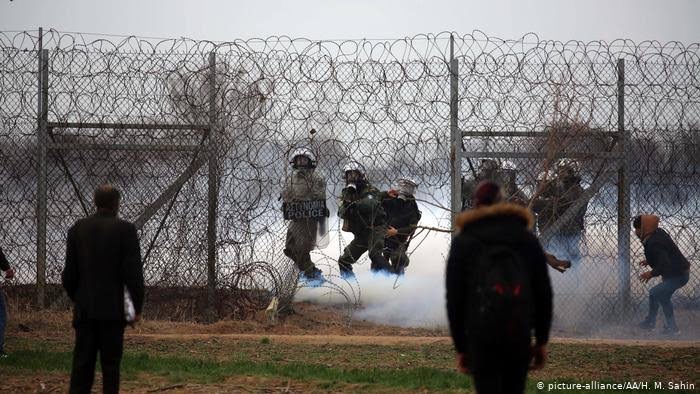The situation at the Greek-Turkish Border: A political game feeding the humanitarian crisis
- Words for Welcome
- Apr 1, 2020
- 3 min read

On 28th of February, Turkish Prime Minister - Recep Tayyip Erdogan - ‘opened the gates’ to the Greek-Turkish border, enabling refugees in the thousands to pass through into in Europe. However, the refugees were not met with a warm welcome from the other side of the border as Greek police officers deployed tear gas, water cannons and rubber bullets, while the Greek Prime Minister Kyriakos Mitsotakis ceased acceptance of new asylum applications for a period of a month.
This has caused a violent clash between refugees and Greek officials, resulting in the death of at least one Syrian man and, as claimed by Turkey, 164 wounded people. There has also been online reports and videos exemplifying Greek officials’ attempts to sabotage and push boats carrying asylum seekers back to Turkish waters, which caused the death of a 2-year-old Syrian boy. In response to this violence that erupted along the border, Tayyip Erdogan deployed Turkish troops to prevent a ‘push-back’ of refugees from the Greek side of the border, further elevating tensions between the two countries.
This action followed intense bombardment of the Idlib province in Syria that claimed the lives of at least 33 Turkish soldiers, which Turkish officials say would cause many Syrian refugees to migrate into Turkey and would therefore surpass the country’s capacity to support asylum seekers. On the other hand, Greece and the EU disagrees with this reason, instead accusing Turkey of intentionally goading refugees to cross border as a bargaining chip for financial aid or military support in their geopolitical conquest in Syria. In fact, Mitsotakis claims in a news conference touring the border region, that “this is no longer a refugee problem”
Even considering both sides’ reasons, there is not a clear hero and villain. Both countries violated international laws and agreements in their poor handling of the situation. Tayyip Erdogan contravened with the March 2016 EU deal, whereby Turkey would receive 6 billion euros to act as host and stop refugees from entering Europe. At the same time, with the refusal of new asylum applications, Mitsotakis violated the 1951 United Nations’ Refugee Convention, which prohibits the the suspension of accepting asylum applications. Nevertheless, what is apparent is that the situation has further victimized thousands of asylum seekers, already fleeing war-torn countries or oppressive regimes.

Ever since the 2016 Turkey-EU deal, asylum seekers have been transformed into political pawns for these European countries to achieve their own geopolitical aims. This comes at a great sacrifice to their wellbeing. With this incident alone, refugees have been led by the Turkish government into thinking that they could enter the Europe through the Greek-Turkish border and then denied any application for refuge by the Greek government. This leaves many asylum seekers stranded, unaccepted by the two countries, whose governments show indifference towards the harsh circumstances that initially provoked them to leave their home countries.
It is understandable that both Greece and Turkey are struggling to accommodate the 61,500 and 3.5 million refugees - a large proportion of the European asylum seeker population, especially after the financial crisis of 2008 that left both countries in debt and turmoil. Yet, we cannot simply tolerate the Greek and Turkish government’s political exploitation and violence towards persecuted individuals. We cannot excuse the insensitive response of the governments towards this issue that affects and will continue to affect millions of people. Furthermore, as evident in the EU’s failed attempts to resolve the issue in the March 10 emergency summit, we must not appease other European countries inaction in this crisis.
Refugees are not pieces on a geopolitical chessboard. Refugees are not a load for countries to bear either. Refugees are individuals, who need compassion and asylum and should be treated accordingly.
Sources:
Text -
"Has the World Learned the Lessons of the 2015 Refugee Crisis", World Politics Review
"A journey through the refugee crisis on the Greece-Turkey border", Aljazeera
"Vigilantes in Greece Say 'No More' to Migrants", New York Times
"One day of respite for refugees on the Turkey-Greece border", Aljazeera
"Turkey's refugee 'extortion policy' must end", Financial Times
"Erdogan in talks with European leaders over refugee cash for Turkey",The Guardian
"Briefing: A manufactured refugee crisis at the Greek-Turkish border", The New Humanitarian
World Bank Asylum seeker statistics
Photos -
"Vigilantes in Greece Say 'No More' to Migrants", New York Times
"On the Greek Turkish border, Gunshots, Vigilantes, and Choreographed Chaos", Daily Beast








Comments